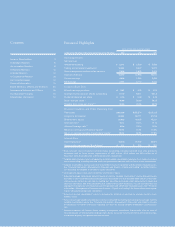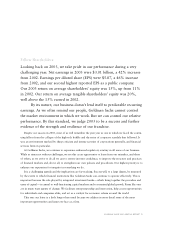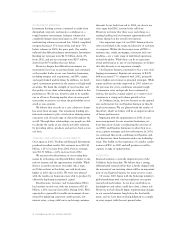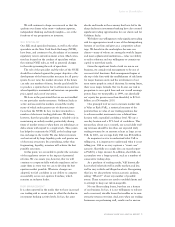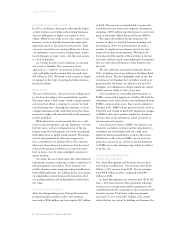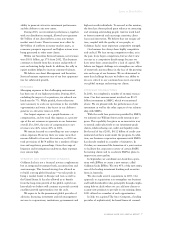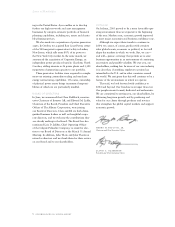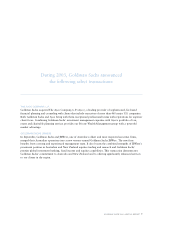Goldman Sachs 2003 Annual Report Download - page 6
Download and view the complete annual report
Please find page 6 of the 2003 Goldman Sachs annual report below. You can navigate through the pages in the report by either clicking on the pages listed below, or by using the keyword search tool below to find specific information within the annual report.
4GOLDMAN SACHS 2003 ANNUAL REPORT
Letter to Shareholders
INVESTMENT BANKING
Investment banking activity continued to suffer from
diminished corporate and investor confidence in a
tough business environment. Industry volumes for
completed mergers decreased again in 2003 and equity
underwriting volumes remained low. Global completed
mergers decreased 17% from 2002, and were 70%
below volumes in 2000, the prior peak. Our results
reflected this difficult industry environment. Investment
Banking net revenues were $2.71 billion, down 4%
from 2002, and pre-tax earnings were $207 million,
down from $376 million the year before.
However, despite this difficult environment, we
maintained our focus on serving clients and continued
as the market leader in our core franchise businesses,
including mergers and acquisitions, and IPO, equity,
and equity-linked underwriting. In addition, we devel-
oped a prominent position in the issuance of high-yield
securities. We think the strength of our franchise and
the quality of our client relationships are evident in this
performance. We do not, however, seek to be number
one in all areas. Pursuing market share in some prod-
ucts makes no sense to us when the profitability is too
small or non-existent.
We believe that our role as a core advisor to clients
has never been stronger. Our investment banking pro-
fessionals continue to play a vital role in advising senior
executives and a broad range of clients throughout the
world. Through these relationships, our people are able
to identify the needs of our clients and offer solutions
by providing advice, products and services from across
our firm.
TRADING AND PRINCIPAL INVESTMENTS
Once again in 2003, Trading and Principal Investments
produced excellent results. Net revenues were $10.44
billion, a 21% increase from 2002. Pre-tax earnings
were $3.51 billion, a 64% increase from 2002.
We measure the effectiveness of our trading busi-
nesses by evaluating overall profitability relative to the
risk we assume and the opportunities available. While
there is no perfect measure of market risk, a topic
we’ll discuss later in this letter, our risk levels were
higher in 2003 than in 2002. We were very pleased
with the results our businesses were able to produce by
effectively deploying incremental capital.
Fixed Income, Currency and Commodities (FICC)
had another record year, with net revenues of $5.60
billion, a 20% increase from 2002. During 2003, FICC
operated in a generally favorable environment charac-
terized by tightening corporate credit spreads, low
interest rates, a steep yield curve and strong customer
demand. As we look forward to 2004, we do not see
clear signs that FICC activity levels will slow.
However, we know that there is no such thing as a
trading backlog and our business opportunities will
always depend on the overall environment.
One important aspect of our FICC business that is
often overlooked is the range and diversity of activities
it comprises. Within the five major areas of FICC—
interest rates, credit, mortgages, currencies and com-
modities—are a wide range of individual operations
around the globe. While there can be no guarantee
about performance in any of our businesses, we believe
that this diversity is an important strength.
Our Equities business continued to face a very chal-
lenging environment. Equities net revenues of $4.28
billion increased 7% compared with 2002, primarily
due to higher net revenues in principal strategies. While
equity markets certainly improved in 2003 relative to
the previous few years, conditions remained tough.
Commission rates and spreads have continued to
decline, the need to commit capital in a variety of cir-
cumstances is rising and volume growth is low.
At Goldman Sachs, we have focused on the optimal
size and structure for our Equities business in this dif-
ficult environment. We are pleased with the results of
this effort, which we believe will be an important driver
of future performance.
Beginning with the appointment in 2002 of com-
mon management for our securities businesses, we
have been more closely coordinating the activities of
our FICC and Equities businesses to share best prac-
tices, capture synergies and drive efficiencies. In 2003,
we continued this work, combining our Equities cash
and derivatives client businesses under one leadership
team. This builds on the experience of a similar combi-
nation in FICC in 2000 and will position us well to
capture a range of opportunities.
RESEARCH
Research remains a critically important part of the
Goldman Sachs franchise. We believe that a strong,
differentiated research effort that is firmly aligned with
the interests of our investing clients will be an important
part of our Equities business for many years to come.
Of course, 2003 began with the brokerage industry’s
global settlement with various regulators on equities
research-related matters. As we have said before, in
hindsight we and others could have done a better job.
However, we had already begun implementing changes
in our research business long before the final settle-
ment, and we have been working diligently to comply
in every respect with the new ground rules.


